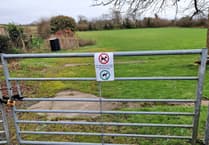A petition submitted by campaigners following the tragic death of a young father at an accident 'black spot' in Pembrokeshire has been debated at the Senedd today (Wednesday).
The petition, which attracted more than 10,300 signatures in a little over a month, was started after Ashley Thomas Rogers, 29, from Kilgetty, died in a crash on the A477 road between Milton and Pembroke Dock in May.
Campaigners have described the Nash Fingerpost junction as treacherous, with three fatal accidents in 12 years, calling for urgent and comprehensive safety measures.
Jack Sargeant, who chairs the petitions committee, led the Senedd debate which was held during road safety week.
‘Near misses’
The Labour MS, who visited the junction in October, said: “During the visit I witnessed several near misses and saw firsthand the danger of the current situation.
“Having seen it with my own eyes, the surprise is not that there have been fatal incidents at this junction – it’s that they don’t happen all of the time.”
A YouTube video filmed by campaigners shows near misses at the A477 junction, with vehicles pulling out and forcing oncoming traffic on the 60mph road to slow down or stop.
Mr Sargeant welcomed an announcement from the Welsh Government that traffic signals will be installed in response to the petition submitted by Ashley’s friend, Elliott Morrison.
However, he said campaigners would prefer to see a roundabout and a second petition has been submitted, attracting nearly 400 signatures in a matter of weeks.
Mr Sargeant called for ministers to bring forward safety measures urgently.
‘Dangerous’
Samuel Kurtz – the Carmarthen West and South Pembrokeshire MS – has long campaigned alongside his Westminster colleague Simon Hart for changes at the lethal junction.
The Conservative told the Senedd: “This is not the first time I have spoken about this dangerous junction in this chamber.
“However, I am hopeful that this could be the last time the necessity of safety improvements at the Nash Fingerpost junction is discussed.
“I am pleased that the Welsh Government has realised the calls for improvements could no longer be ignored.”
Mr Kurtz paid tribute to Ashley Thomas Rogers, who left behind a devastated fiancée, son and family.
He told MSs: “His death shook our community – our thoughts continue to be with his friends and family. Yet, sadly, this was not the first fatality at this junction.”
‘Deaf ears’
Mr Kurtz added: “The debate locally has been one of frustration – that calls for safety improvements have, for a decade, fallen on deaf ears.”
Cefin Campbell, the Plaid Cymru MS for Mid and West Wales, told the chamber that some of his constituents refuse to use the junction at all due to the danger.
He said: “Traffic signals are a step in the right direction but I believe we should support the community’s calls for consideration of building a roundabout.”
Mr Campbell raised concerns about the alarmingly high number of accidents, with police reporting 231 accidents with 99 people killed or seriously injured in Pembrokeshire last year.
Joyce Watson, a Labour backbencher, who also represents Mid and West Wales, called for a review of any measures taken to improve safety at the junction.
“A solution must come and it must come quickly,” said the MS, who lives in Pembrokeshire.
Response
Julie James, responding for the Welsh Government, began by passing on her own heartfelt sympathies to Ashley Rogers’ family.
Ms James, who told the BBC that she lost her husband in a car crash while their baby daughter was less than a year old, said: “I know from personal experience how dreadful it is to lose somebody in that way.”
Ms James said new road markings have been laid and safety signs have been erected, adding that a temporary 40mph limit and a no U-turn order are being implemented.
Wales’ climate change minister said work on traffic signals will start this financial year.
During the meeting on Wednesday, November 22, she said the Welsh Government will consider a roundabout subject to review of the measures already taken.
She stressed that a roundabout is not an instant solution and it would take at least three years to put in place.




